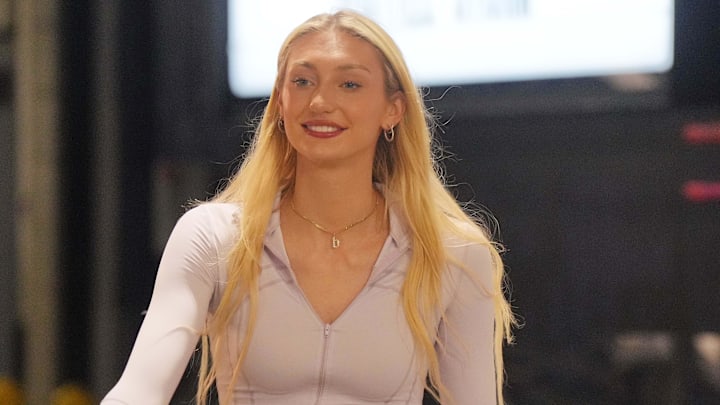Q&A with WNBA's Cameron Brink: Life as a Rookie in Most Competitive League in Sports

The following is a conversation between Los Angeles Sparks forward and WNBA rookie Cameron Brink and Fastbreak on SI's Dustin Schutte. Brink is partnering with STAAR Surgical to promote the EVO Implantable Collamer Lenses (EVO ICL).
There is no league more competitive in American sports than the WNBA. Even for Cameron Brink, the No. 2 overall pick in the 2024 WNBA Draft, the transition from college to the pros is incredibly challenging.
Recently, Brink sat down with Fastbreak on SI to discuss her rookie season, the relationships she established with the historic WNBA rookie class, the teammates she's leaned on early in her career and plenty more.
Question: As you started your rookie career, what did you notice was the biggest difference in the transition from the college game to the WNBA?
Brink: "I would say, going into it, not fully realizing how quick the turnaround is. After coming off a hard college season where you make it pretty far (in the NCAA Tournament) and you play a lot of minutes, then you go into an even more physical league, where it's faster. It's a really tough transition that I don't think people talk enough about. It's really tough, but it's worth it."
Question: There were a lot of expectations for this 2024 WNBA rookie class. As a member of it, did you feel the pressure to come in and perform at a high level immediately? Or were expectating that of yourself, regardless of the outside noise?
Brink: "There's always pressure. I always make it a good thing — pressure is a privilege. I would say there's always more internal pressure with being around some of the best athletes. Everyone always puts more internal pressure on themselves. So, I have always had high expectations of myself.
"The games I played (in the WNBA), I think I played really well. So, I'm just going to take that into next year."
Question: When you come into the league with another rookie like Rickea Jackson, you guys going through that together, does that make the transition process easier for you, knowing you're not alone?
Brink: "Oh, 100 percent. She's my girl. I freaking love her. She's doing so well right now. It definitely means a lot to have someone by your side who is going through the same thing, who knows what it's like to have those nerves and not really know what's going on. She's the best."
Question: On that same level, has there been a veteran player on the Los Angeles Sparks, or maybe in the WNBA in general, that you've leaned on early in your career for advice?
Brink: "Definitely Dearica Hamby. She's a huge source of steadiness, not just for me but for the whole team. She's just a great role model and I really just admire and respect her. And then, someone who was injured at the beginning of the season, it was just great to see how she handled going through everything — Azura Stevens. She had a wrist injury.
"I kind of got to see how she showed up for everyone even when she was injured. How she cheered really loudly and how she was engaged in what was going on. Her mentorship has meant a lot to me, too."
Question: I mentioned the highly-touted rookie class earlier, is there a bond that you have with other members of that class? Is there a special connection? Do you all lean on each other?
Brink: "Speaking for me, I made a really big effort to try and connect with everybody. I think that went a long way. We're all going to have each other's backs. We are under unprecedented pressure and viewership — we don't take it likely. It's a big deal and it's something that is fun.
"Whenever I see them, I love to catch up with them. I definitely think we could all call each other up and be able to vent to each other, rely on each other."
Question: What kinds of things were you doing to make connections with the others?
Brink: "Just being myself, honestly, I'm an outgoing person. It was kind of a cool shift, going from competing against them in college to now being at the draft. We spent a lot of time together going from event to event. It was really tiring.
"The day after we get drafted, we have to go to office meetings, that's just how it is. They're a really good group of girls."
Question: In your time on the court in the WNBA, is there a specific aspect of your game that you felt like made you fit in? And then another aspect where you need to improve?
Brink: "Definitely defense (is where I played my best). I feel like that's obvious. I did a good job of holding my own. Offensively, I still think I did a great job trying to navigate a new offense that is completely different from what I did in college.
"I think there's room to improve overall."
Question: How have the EVO Implantable Collamer Lenses (EVO ICL) helped with your vision on and off the court?
Brink: "I've struggled with eyesight since I was a fourth grader. I've been wearing contacts from a young age. So, being able to have something that gave me peace of mind — I wasn't going to lose a contact in a game, I could play not worrying about giving contacts to my trainer.
"It's really life-changing being able to wake up and see. It's a big deal. I get my bad eyesight from my dad, so I blame him. But, now I feel like I've forgotten what it's like to have to put in contacts every day and deal with that. It's definitely life changing."
